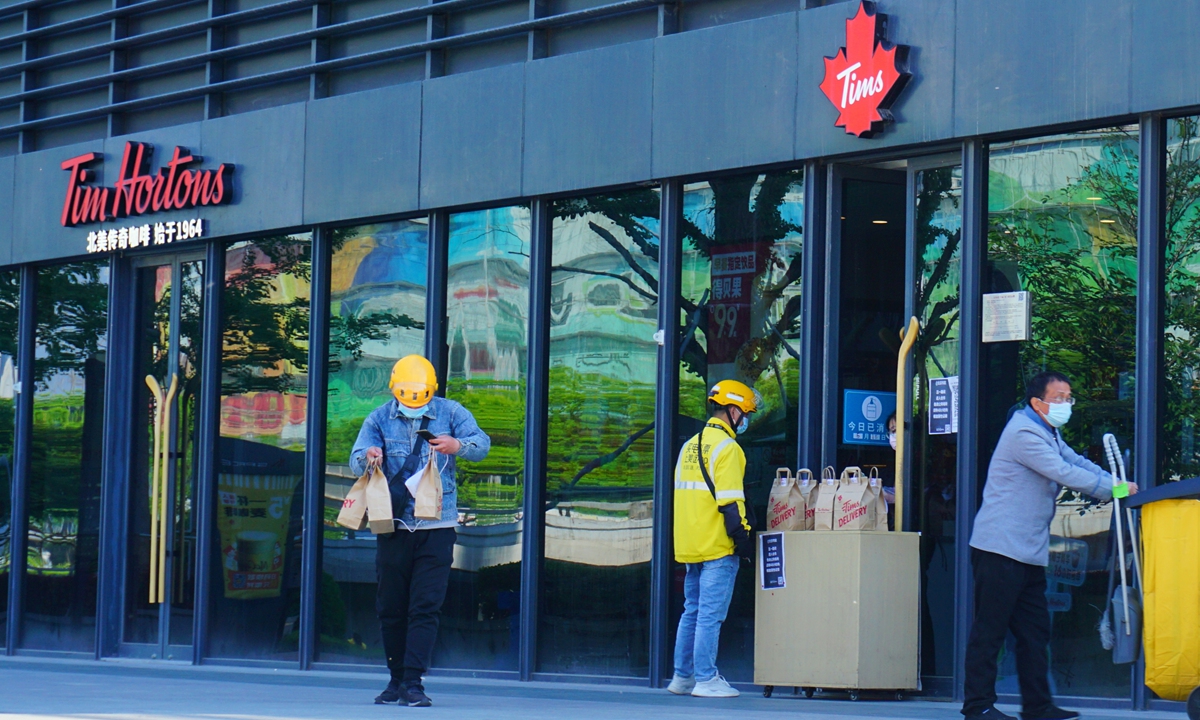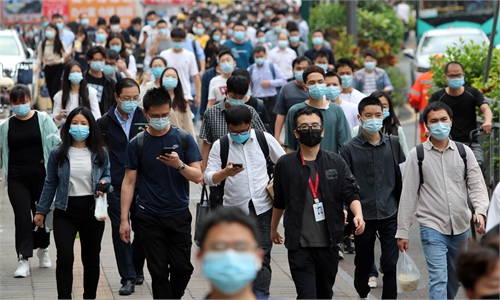China taps consumption potential with vouchers, retail sales likely to expand in Q3
Retail sales likely to expand in Q3 amid aggressive stimulus

Food delivery staff collect orders from a cafe offering takeout only after in-house dining was converted into delivery for the May Day holidays. Photo: VCG
Chinese cities are scrambling to hand out consumption vouchers to simulate consumer spending, as the country doubles down on consumption to bolster growth amid mounting downward economic pressure brought about by COVID-19 resurgences and global volatility.The latest to do so is Chengdu, capital of Southwest China's Sichuan Province, which is set to issue two batches of coupons worth a total of 600 million yuan ($88.68 million) starting from Friday. It is the first time for the city to hand out vouchers on such a large scale this year. Consumers can use the coupons at key retail and catering stores, among other businesses, according to the local government.
Since April, at least 19 provinces and municipalities across the country have issued coupons totaling 5 billion yuan, public data showed. Local governments attach growing importance to green consumption by issuing coupons for travel, home appliances and automobiles.
To promote the recovery of tourism, Southwest China's Xizang Autonomous Region announced on Wednesday plans to hand out travel vouchers worth 30 million yuan for use at scenic spots, hotels and transport facilities, and the region will grant subsidies of up to 100,000 yuan to scenic spots that cut admission fees.
While handing out coupons is a direct method of driving up consumption, work needs to be done to improve effectiveness and efficiency of such programs, Zhang Yi, CEO of iiMedia Research Institute, told the Global times on Thursday.
"For example, local governments could choose to hand out more vouchers to families with low incomes or two or three children to help reduce the impact of the pandemic on their lives," Zhang said. He said that platform companies could also play a larger role by intensifying fee cuts to increase the participation of more on-site companies in the programs.
According to research by the Guanghua School of Management of Peking University, which studied five rounds of digital coupons released in Hangzhou, East China's Zhejiang Province, from March to May in 2020, a government subsidy of 1 yuan is able to generate 3.4 yuan to 5.8 yuan of extra spending.
Aside from such measures as doling out vouchers to tackle short-term bottlenecks, some local governments have taken steps to boost longer-term consumption vitality.
Northwest China's Shaanxi Province on Wednesday released a three-year plan to constantly enhance consumers' confidence and boost stable consumption growth. According to a statement on the government's website, the province set a goal for total retail sales to surpass 1.3 trillion yuan by 2024, up over 8 percent each year.
The provinces' accelerated moves came as China's retail sales fell 11.1 percent year-on-year in April due to the impact of COVID-19 flare-ups.
Overall, the impact is short term, with consumption still resilient with great potential in China, and the fundamentals for consumption expansion remain positive, Ministry of Commerce spokesperson Shu Jueting said at a press conference on Thursday.
"With COVID-19 outbreaks gradually brought under control, domestic consumption will recover along with the implementation of a variety of policies to drive domestic demand," she said.
Song Ding, deputy director of the China Urban Economics Research Institute, told the Global Times on Thursday that retail sales are expected to return to expansion territory in the third quarter.
As a major driver of the domestic economy, consumption still serves as a ballast for stable economic growth this year despite challenges posed by COVID-19 resurgences. According to the National Bureau of Statistics, final consumption expenditure contributed 69.4 percent of GDP in the first quarter of 2022.
In order to heighten consumers' fundamental confidence, employment should be stabilized to guarantee stable incomes, Song said. Industrial and supply chains should be smoothened to ensure production resumption, and tax and fee cuts should be intensified with targeted measures to help micro-sized and small businesses survive the headwinds, he said.
Since the annual Central Economic Work Conference was held in December, stabilizing employment has been embodied in a variety of macro-economic policies.
The central government will set aside 61.76 billion yuan of employment subsidies this year, while stepping up efforts in helping pandemic-affected sectors including aviation, catering and tourism to overcome difficulties, widening employment channels and harnessing the role of start-ups in boosting employment.


